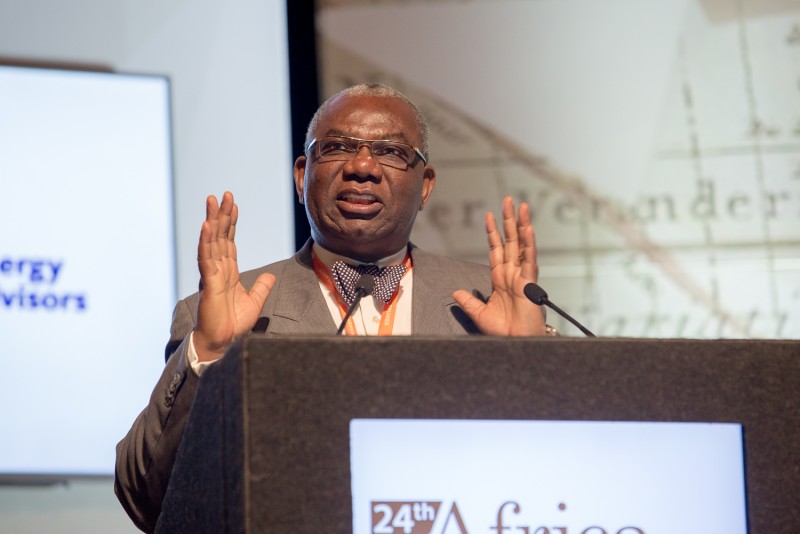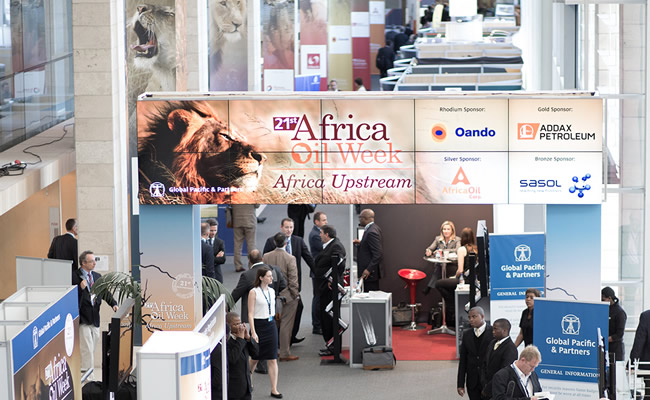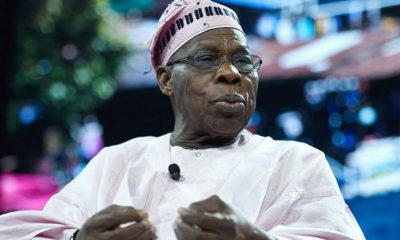Economy
Africa Oil Week to Focus on Nigeria

Estimated to hold 37 billion barrels of proven oil reserves, Nigeria is the second biggest oil-rich country in Africa, after Libya. The exploitation of these resources has been in the hands of the Nigerian National Petroleum Corporation (NNPC) that was established in 1977 as a merger of the Nigerian National Oil Corporation and the Federal Ministry of Mines and Steel. NNPC by law manages the joint venture between the Nigerian Government and international oil companies such as Shell, Agip, ExxonMobil, Total and Chevron.
Despite its rich resources, at present Nigeria’s state-dominated oil industry is declining, afflicted by systemic corruption, starved for international investment, and hit hard by weak oil prices. Despite that malaise, oil remains the country’s chief source of income.
A choice of paths
What many considered a watershed moment for the industry occurred earlier this year in the country’s election with two conflicting strategies for the development of the industry put forward by the two candidates.
The incumbent, Muhammadu Buhari’s planned to retain a nationalized oil industry under the NNPC banner while the vision of his opponent, Atiku Abubakar, was to sell off aging refineries to private buyers to liberalise the economy. In the end Buhari won a tight contest.
The importance of the oil and gas sector for the state cannot be underestimated with more than half of its revenue along with 85 per cent of its export revenue coming from the sector. Despite the 40 billion barrels of oil under its control, Nigeria’s ageing infrastructure can only produce around 2.5 million barrels of crude oil per day.
Adding to this malady is the state of its mid-stream and downstream infrastructure that many believe is in even worse condition than its upstream assets. The refineries dotted around the Niger Delta region are at present producing less than half of the 500,000 barrel per day capacity, with this figure dropping to almost ten per cent late last year.
New beginnings for NNPC
The man charged with implementing the president’s policy is Mallam Mele Kolo Kyari, who took on the role of group managing director of the Nigerian National Petroleum Corporation (NNPC) early this year. He quickly vowed to reverse the trend of petroleum imports into Nigeria by improving the existing refineries and encouraging private sector investment in the refineries.
“We must end the trend of fuel importation as an oil producing country,” he said at a press conference shortly after taking on the role. “We will deliver on the rehabilitation of the four refineries within the life of this administration and support the private sector to build refineries. We will support the Dangote refinery to come on stream on schedule and we will transform Nigeria into a net exporter of petroleum products by 2023”.
He added that the government’s target of raising crude oil production and reserves to three million barrels per day and 40 billion barrels respectively was possible and that he would galvanise the corporation to achieve it by 2023.
When it comes to rooting out the corruption that has plagued the industry in Nigeria he pointed out how much NNPC had changed over the past three years from the old image of a corruption-laden organisation, stressing that he would continue to entrench the culture of accountability in the affairs of the corporation.
“We are going to work to remove every element of discretion from our processes, because discretion is one of the greatest enablers of corruption”, he said. “NNPC will not be opaque, we’ll be transparent to all so that at the end of the day everyone will be in a position to assess us and say what we have done right or wrong”.
Support from OPEC
The Secretary General of the Organization of the Petroleum Exporting Countries (OPEC), Mohammed Sanusi Barkindo, has commended the NNPC for its ongoing reforms aimed at changing the fortunes of the corporation for the better.
“I am glad that you continue to march on with your projects despite the downturn in the Industry, he said. “We have seen the Industry globally suffer in terms of contraction in investment which affected capacity. You have not only been able to stay on course, but you also continue with these projects which are critical for the development of the corporation and the industry in Nigeria.”
“To lead such a sensitive and capital-intensive industry like oil and gas, you must have transparency and accountability as one of your core principles in order to drive change. I am glad I have known Mele Kyari for a very long time. He is a very capable and straightforward individual with a high level of integrity even as a very junior officer. So, he has a track record. I remain confident that together with his team, and with the support of government, he will accomplish the task”.
Building a Nigerian giant
Key to this strategy of reducing imports is the Dangote refinery that is under construction near Lagos. The 650,000 barrels per day (bpd) integrated refinery and petrochemical project will be Africa’s biggest oil refinery and the world’s biggest single-train facility upon completion in 2020. The facility will be able to process a variety of light and medium grades of crude to produce Euro-V quality clean fuels including gasoline and diesel as well as jet fuel and polypropylene.
Nigeria in focus at Africa Oil Week
Relations between South Africa and Nigeria have been strained in recent months after several days of riots in South Africa in September that mainly targeted foreign-owned, including Nigerian, businesses.
But following a visit to South Africa by Nigeria’s President Muhammadu Buhari tensions have eased. A further sign of the improving relationship is the visit of Nigeria’s Minister of State for Petroleum Resources, Timipre Sylva, to Africa Oil Week, the minister proclaiming himself being excited to be travelling to South Africa.
As the largest upstream event on the continent, Africa Oil Week has enjoyed attendance from the industry’s highest-level decision makers for over 25 years. This year is no different, with Nigeria’s brand new NPCC GMD making his international debut at the 2019 conference in Cape Town this November (4-8).
Mallam Melee Kyari will be setting out the future vision of the NNPC under his leadership and participating in a session titled ‘Atlantic Transform Margin (Liberia to Nigeria)’, where he will provide a deep insight into the current operating landscape in some of the most highly sought-after regions.
Economy
Lokpobiri Begs Lawmakers to Reschedule Oil Revenue Executive Order Probe

By Adedapo Adesanya
A joint National Assembly probe into President Bola Tinubu’s new oil revenue executive order was stalled on Thursday following a request for more time by the Minister of Petroleum Resources, Mr Heineken Lokpobiri.
The hearing was convened to scrutinise the executive order directing that royalty oil, tax oil, profit oil, profit gas and other revenues due to the Federation under various petroleum contracts be paid directly into the Federation Account.
Mr Lokpobiri told lawmakers that although he attended out of respect for parliament, he had been notified of the hearing only a day earlier and had not obtained all the relevant documents needed to defend the policy adequately.
He appealed for the session to be rescheduled.
Co-chairman of the joint committee and Chairman of the Senate Committee on Gas, Mr Agom Jarigbe, put the request to a voice vote, and lawmakers approved the adjournment.
A new date is expected to be communicated to the minister.
The executive order signed last week also scrapped the 30 per cent Frontier Exploration Fund created under the Petroleum Industry Act (PIA) and discontinued the 30 per cent management fee on profit oil and profit gas previously retained by the Nigerian National Petroleum Company (NNPC) Limited.
Anchored on Sections 5 and 44(3) of the Constitution, the presidency said the directive was aimed at safeguarding oil and gas revenues, curbing excessive deductions and restoring the constitutional entitlements of federal, state and local governments to the
However, the order has sparked criticism within the industry, one of which was from the Petroleum and Natural Gas Senior Staff Association of Nigeria (PENGASSAN), whose president, Mr Festus Osifo, called for an immediate withdrawal of the order, warning that it could undermine the PIA and erode investor confidence.
Meanwhile, at another session, the Chairman of the Senate Committee on Finance, Senator Mohammed Sani Musa, disclosed that President Tinubu would soon transmit proposals to amend certain provisions of the PIA to align with current economic realities.
He noted that while many expect the executive order to boost revenue automatically, Nigeria has yet to achieve its desired income levels.
He did not specify which sections of the law would be targeted, but suggested that the drive to enhance revenue generation would necessitate legislative adjustments.
The PIA, signed into law in 2021 by the late ex-President Muhammadu Buhari, overhauled the governance, regulatory and fiscal framework of Nigeria’s oil and gas sector, commercialised the NNPC and restructured revenue-sharing arrangements.
Economy
NGX Group Declares N2 Final Dividend, 1-for-3 Bonus Issue for FY’25

By Aduragbemi Omiyale
Shareholders of Nigerian Exchange (NGX) Group Plc will receive one new share for every three held as of April 10, 2026, as a bonus, according to a proposal from the board.
This is in addition to a final dividend of N2.00 proposed by the board to shareholders for the 2025 fiscal year, which raised the total dividend for the year to N3.00, according to the financial statements of the company filed with NGX Limited.
Last year, NGX Group recorded a sterling performance, with its earnings growing by 36.0 per cent to N22.9 billion from N16.9 billion due to sustained growth across core business segments, improved customer penetration on the back of increased investor activity and rising investor confidence.
The operating profit in the year increased by 44.4 per cent to N11.8 billion, while pre-tax profit jumped to N15.6 billion from N13.6 billion in 2024, with the earnings per share (EPS) at N4.75.
As for its balance sheet, total assets increased to N71.0 billion from N68.0 billion, while shareholders’ equity strengthened to N55.2 billion
The improved debt-to-equity position reflects a conservative capital structure, enhanced solvency profile, and strong retained earnings growth.
“Our 2025 performance demonstrates the resilience of our business model and the effectiveness of disciplined strategic execution. Strong revenue growth, improved operating margins and a strengthened balance sheet reinforce our commitment to delivering sustainable long-term shareholder value.
“The increased dividend and bonus issue reflect the Board’s confidence in the sustainability of our earnings and the robustness of our capital position as we continue to deepen Nigeria’s capital markets.
“We are confident that the momentum that we have built in 2025 will be sustained, given investor confidence in the Nigerian capital market and a pipeline of exciting new listings that will broaden and deepen the market,” the chairman of NGX Group, Mr Umaru Kwairanga, said.
On his part, the chief executive of the organisation, Mr Temi Popoola, said, “We delivered strong top-line growth and enhanced profitability in 2025 despite macroeconomic headwinds.
“Our 36 per cent core revenue growth, improved operating efficiency and successful deleveraging have strengthened our capital base and financial flexibility, supporting the increased dividend and bonus issuance.
“As regulatory standards evolve, including the recent upward review of minimum capital requirements by the Securities and Exchange Commission (SEC), our robust balance sheet positions us to meet new thresholds seamlessly while continuing to invest in liquidity expansion, product innovation and market infrastructure to build a resilient, globally competitive exchange group.”
Economy
FG Targets Credit Access For 50% Workers By 2030

By Adedapo Adesanya
The Vice President, Mr Kashim Shettima, inaugurated the Board of the Nigerian Consumer Credit Corporation (CREDICORP) and gave a 50 per cent access target for workers, saying consumer credit was critical to Nigeria’s ambition of becoming a one-trillion-dollar economy by 2030.
According to him, President Bola Tinubu established the CREDICORP to build a trusted credit infrastructure, provide catalytic capital to lower borrowing costs, and help Nigerians overcome long-standing cultural resistance to credit.
Speaking on Thursday in Abuja when he inaugurated the board on behalf of the President, the Vice President, in a statement by his spokesman, Mr Stanley Nkwocha, said that the quality of life of Nigerians cannot improve without closing the gap between access to capital and human dignity.
“A civil servant who earns honestly does not have to chase sudden wealth just to buy a vehicle, or save for ten years to buy one. A young professional should not remain in darkness simply because solar power must be paid for all at once,” the Vice President said.
VP Shettima disclosed that in just one year of operations, CREDICORP has disbursed over ₦37 billion in consumer credit to more than 200,000 Nigerians, with over half of them accessing formal credit for the first time.
The Vice President said the organisation was specifically tasked with building credit infrastructure to bridge the trust gap between lenders and borrowers, providing wholesale capital and credit guarantees through its portfolio company.
“Ultimately, these critical jobs of CREDICORP will enable access to consumer credit to at least 50 per cent of working Nigerians by 2030,” he said.
The Vice President explained that the new board’s role was not ceremonial as they are custodians of the organisation’s mission, adding that the long-term strength of the institution would depend on their “vigilance, integrity, sacrifice, and commitment.”
He directed Board members to uphold Public Service Rules, the Board Charter, and all applicable governance frameworks, warning that accountability and stewardship of public resources were non-negotiable.
The Chairman of CREDICORP, Mr Aderemi Abdul, expressed appreciation to President Tinubu for his vision behind the formation of CREDICORP and for the confidence reposed in them, noting that the establishment of the corporation marked an important step towards strengthening the nation’s financial architecture.
He assured President Tinubu that the board understands its responsibility and will guide the institution to deliver meaningful benefits to Nigerians.
For his part, Mr Uzoma Nwagba, Managing Director/CEO of CREDICORP, recalled watching President Tinubu say 20 years ago that consumer credit is one of the major tools that will improve the lives of Nigerians.
He noted that over the past 18 months, the institution has benefited more than 200,000 Nigerians, including students.
He assured that the presidential vision behind CREDICORP would not be taken lightly, as the team considers their appointments a unique, once-in-a-lifetime opportunity.
Other members of the board inaugurated include Mrs Olanike Kolawole, Executive Director, Operations; Mrs Aisha Abdullahi, Executive Director, Credit and Portfolio Management; Mr Armstrong Ume-Takang (MD, MoFI), Representative of MoFI; Mrs Bisoye Coke-Odusote (DG, NIMC), Representative of NIMC; and Mr Mohammed Naziru Abbas, Representative of FMITI.
Others are Mr Marvin Nadah, Representative of FCCPC; Mrs Chinonyelum Ndidi, Representative of the Federal Ministry of Finance; Mr Mohammed Abbas Jega, Independent Director; and Mrs Toyin Adeniji, Independent Director.
-

 Feature/OPED6 years ago
Feature/OPED6 years agoDavos was Different this year
-
Travel/Tourism10 years ago
Lagos Seals Western Lodge Hotel In Ikorodu
-

 Showbiz3 years ago
Showbiz3 years agoEstranged Lover Releases Videos of Empress Njamah Bathing
-

 Banking8 years ago
Banking8 years agoSort Codes of GTBank Branches in Nigeria
-

 Economy3 years ago
Economy3 years agoSubsidy Removal: CNG at N130 Per Litre Cheaper Than Petrol—IPMAN
-

 Banking3 years ago
Banking3 years agoSort Codes of UBA Branches in Nigeria
-

 Banking3 years ago
Banking3 years agoFirst Bank Announces Planned Downtime
-

 Sports3 years ago
Sports3 years agoHighest Paid Nigerian Footballer – How Much Do Nigerian Footballers Earn















